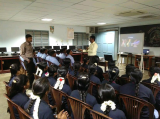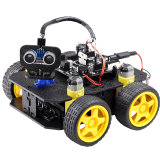🔹 Level 1: Ages 6–8 (Beginner – Explorers)
Goal: Introduce basic robotics and logic through play and storytelling.
Topics:
-
What is a robot? (Basic definition and examples)
-
Input/output devices (Sensors and actuators)
-
Basic logic and sequences
-
Introduction to motors and movement
-
Simple problem-solving (e.g., navigate a maze)
🔹 Level 2: Ages 9–11 (Intermediate – Builders)
-
Goal: Introduce programming concepts, sensors, and mechanics.
Topics:
-
Robotics components: sensors, gears, motors, microcontrollers
-
Simple circuits and electronics
-
Block-based programming (e.g., Scratch, MakeCode)
-
Basic robot navigation and obstacle avoidance
-
Team-based challenges (e.g., line-following robot)
-
🔹 Level 3: Ages 12–15 (Advanced – Innovators)
Goal: Deepen programming skills, problem-solving, and real-world applications.
Topics:
-
Microcontrollers: Arduino, Raspberry Pi
-
Sensors and actuators (ultrasonic, IR, camera, etc.)
-
Autonomous robot programming
-
Intro to AI and computer vision (basic)
-
CAD for robotics (3D design of robot parts)
-
Mini projects (e.g., smart car, obstacle avoider, robotic arm)
-
| Module | Focus | Activities |
|---|---|---|
| 1. Introduction | What is Robotics? | Fun facts, robot videos, naming their own robots |
| 2. Basics of Coding | Block-based coding | Drag-drop logic games |
| 3. Sensors & Motors | Real-world applications | Hands-on testing with kits |
| 4. Building Robots | Assemble and code | Group robot builds |
| 5. Simulation Lab | Test before building | Simulate circuits and motion |
| 6. Projects | Problem-solving | Mini projects (maze solving, light followers) |
| 7. Show & Tell | Presentations | Explain and demonstrate their robots |









